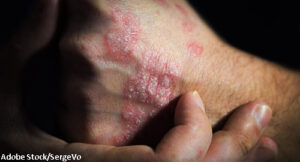 ORLANDO, FLORIDA—Given the intersection between rheumatology and dermatology for many patients with autoimmune diseases, it’s helpful to hear from specialists in both fields regarding disease management strategies. With this in mind, the ACR Education Exchange 2023 session, Biologics Management of Psoriasis, provided a comprehensive and extremely helpful discussion of psoriasis treatment as seen through the eyes of an expert dermatologist.
ORLANDO, FLORIDA—Given the intersection between rheumatology and dermatology for many patients with autoimmune diseases, it’s helpful to hear from specialists in both fields regarding disease management strategies. With this in mind, the ACR Education Exchange 2023 session, Biologics Management of Psoriasis, provided a comprehensive and extremely helpful discussion of psoriasis treatment as seen through the eyes of an expert dermatologist.
Disease Severity
To begin his talk, Anthony Fernandez, MD, PhD, W.D. Steck Chair of Clinical Dermatology, Departments of Dermatology and Pathology, Cleveland Clinic, noted that psoriasis affects approximately 2–3% of the world’s population.1 Psoriasis represents a hallmark Th1/Th17 inflammatory disease, and the condition is related to an increased risk for a number of comorbidities. For example, severe psoriasis is an independent risk factor for myocardial infarction and stroke, and patients with severe psoriasis have a 57% increased risk of cardiovascular death, independent of traditional risk factors, over the general population.2 Evidence also suggests that patients with severe psoriasis may have a reduced life expectancy—five years shorter than age and sex-matched controls.3
Dr. Fernandez pointed out that various ways exist to grade disease severity in psoriasis, and many dermatologists begin by estimating the body surface area (BSA) involved. Using the palm of the hand (including the thumb) as a benchmark to represent about 1% BSA, clinicians can quickly determine approximate BSA involvement on the physical exam.
The National Psoriasis Foundation (NPF) grades BSA of <3% as mild, 3–10% as moderate and >10% as severe psoriasis. Although these measures are important, Dr. Fernandez noted that BSA may tell only part of the tale for patients. The specific anatomic areas involved and the physical symptoms associated with skin and nail findings make a big difference in quality of life for patients. For example, a patient with involvement of sensitive areas, such as the genitals, or very visible areas, such as the face, may believe their disease is severe even if the BSA involved is low. The psychological effects of psoriasis on patients are being recognized more and more, and this is an important part of the clinical evaluation and discussions with providers.
Dr. Fernandez reported that recent work from the International Psoriasis Council (IPC) has been helpful in creating a binary classification system that seeks to streamline access to systemic therapy for patients who previously may have been undertreated. Under the IPC schema, patients can qualify for systemic therapy if they fit into any of the following categories:



